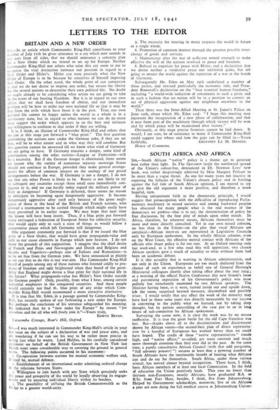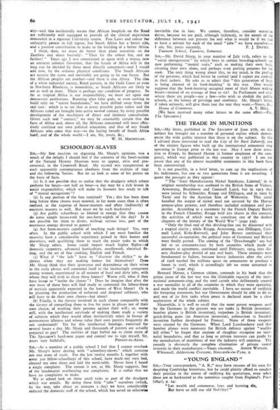SOUTH AFRICA AND AFRICA
Snt,—South African " native " policy is a theme apt to generate heat, rather than light. In The Spectator lately the northward spread of the Union's colour-bar, denounced in Dr. Norman Leys' new book, was rather despairingly admitted by Miss Margery Perham to be more than a vague threat. As one for many years not inactive in exposing the fallacies of the Union's chosen policy and in battling against the full tide of South African opinion, I am moved to try to give the old argument a more positive, and therefore a more hopeful, turn.
Having unrepentant faith in the democratic principle, I would suggest that preoccupation with the difficulties of reproducing Parlia- mentary machinery in mixed societies and among backward peoples has obscured for many people what is the real essence of the democracy we profess—that is to say, the determination of policy by free discussion, by the free play of minds upon other minds. In Africa, therefore, by whatever means, Africans themselves must be more and more directly consulted. Yet in our own mixed colonies, no less than in the Union—on the plea that vocal Africans are untypical—African interests are represented in Legislative Councils only by European spokesmen. In the wholly African colonies, even on the West Coast, the effective mental contact with Africans of the officials who shape policy is far too rare. At an Oxford meeting only last week-end, as a few who read this will appreciate, two chance African speakers gave a touch of actuality to what without them had been an academic debate.
It is this actuality that is wanting in African administration, and not only in the Union. Europeans are too much sheltered from the chance of such an experience as befell one of General Hertzog's Ministerial colleagues shortly after taking office about the year 1924 ; at a meeting of the official Native Conference this new broom's loose and patronising exposition of his Government's policy was most politely but trenchantly examined by two African speakers. The Minister having been, as it were, turned inside out and upside down, left the room, surprised beyond measure, discomfited and possibly wiser. I would testify that any effect the work of the minority may have had in those same years was directly measurable by our success in conveying to the public what we learned, not by taking deep thought, but by patient unravelling of the case put to us in long hours of sub-committee by African spokesmen.
Surveying the scene now, it is clear the work was by no means ineffective. It is true the great battle for the old Cape franchise was lost. But—thanks above all to the discrimination and discernment shown by African voters—the second-best plan of direct representa- tion by a handful of Europeans has worked better than we could have hoped. The credit of these " native representatives " stands high, and " native affairs," so-called, get more constant and much more thorough attention than they ever did in the past. At the same time, a purely consultative African Council (with that odd perquisite, "full advisory powers! ") secures at least that a growing number of South Africans have the inestimable benefit of hearing what Africans can and do Say for themselves. South Africa, under these various stimuli, has moved almost beyond recognition. There have, I think, been African members of at least one local Commission. In the field of education the Union positively leads. This year no fewer than thirteen non-Europeans, mostly Africans, have graduated BA. or B.Sc. from Fort Hare, besides, I think, five from Johannesburg. Helped by Government scholarships, moreover, five or six Africans a year are now doing the full medical course at Johannesburg Univer-
sity—and this incidentally means that African hospitals on the Rand are sufficiently well equipped to provide all the clinical experience demanded in a rigorous University course. Pass Laws and colour bar unhappily persist in full rigour, but South Africa has a better side, and a positive contribution to make to the building of a better Africa.
I think, then, we must do better than plant ourselves on the Zambesi and shout hoarsely: "Thus far the colour bar, and no farther! " Years ago I was constrained to agree with a friend, now an eminent colonial Governor, that the future of Africa will in the long run be decided by those most directly concerned—and I would add now, by the arduous physical conditions. The South Africans are nearest the scene and inevitably are going to be one factor. But the African peoples are another—and there is also Africa. The idea of a white industrial society, Rand pattern, in the Gold Coast or even in Northern Rhodesia, is moonshine, as South Africans are likely to see as well as most. There is perhaps one condition of progress. So far as tropical Africa is our responsibility, we must act upon our democratic professions. Running after false gods, or even seeking to build only on "native foundations," we have drifted away from the real task: which is to see that at every possible point rulers and the Africans ruled are brought into active mental contact, by every possible development of the machinery of direct and intimate consultation. Given such real " contact," we may be reasonably certain that the facts of Africa and, above all, the Africans concerned will most effec- tively continue our own political education, and that of any South Africans who come that way—to the lasting benefit of South Africa itself, and of the whole world.—I am, Sir, yours, &c., W. M. MACMILLAN.


























 Previous page
Previous page